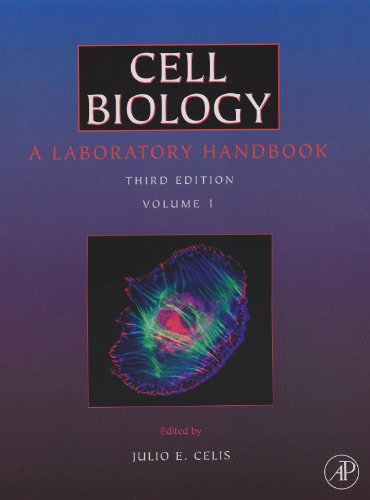Articoli correlati a Cell Biology: A Laboratory Handbook

This four-volume laboratory manual contains comprehensive state-of-the-art protocols essential for research in the life sciences. Techniques are presented in a friendly step-by-step fashion, providing useful tips and potential pitfalls. The important steps and results are beautifully illustrated for further ease of use. This collection enables researchers at all stages of their careers to embark on basic biological problems using a variety of technologies and model systems. This thoroughly updated third edition contains 165 new articles in classical as well as rapidly emerging technologies.
Topics covered include:
- Cell and Tissue Culture: Associated Techniques, Viruses, Antibodies, Immunocytochemistry (Volume 1)
- Organelle and Cellular Structures, Assays (Volume 2)
- Imaging Techniques, Electron Microscopy, Scanning Probe and Scanning Electron Microscopy, Microdissection, Tissue Arrays, Cytogenetics and In Situ Hybridization, Genomics and Transgenic Knockouts and Knock-down Methods (Volume 3)
- Transfer of Macromolecules, Expression Systems, Gene Expression Profiling (Volume 4)
- Indispensable bench companion for every life science laboratory
- Provides the latest information on the plethora of technologies needed to tackle complex biological problems
- Includes numerous illustrations, some in full color, supporting steps and results
Le informazioni nella sezione "Riassunto" possono far riferimento a edizioni diverse di questo titolo.
Married, with three children and one cat (Max William), Dr. Celis currently resides in Denmark where he holds among his many titles the chair to the Symposium and Prize Committee of the Danish Cancer Society, as well as the acting Chairman of the Nordic Molecular Biology Association (NOMBA). Dr. Celis is currently the Vice President of the European Molecular Biology Laboratory (EMBL) Council and leader of the Danish Delegation to the OECD Megascience Forum subgroup on Bioinformatics. He is also the European Union Observer to the International Nucleotide sequence database collaboration and a member of the EMBO Course Committee.
Nigel Carter is the Head of Molecular Cytogenetics at the Sanger Centre, Cambridge UK and is currently the Secretary of the International Society for Analytical Cytology. Receiving his BA and D.Phil degrees from the University of York where he specialised in parasitology, Nigel became interested in flow cytometry when he was appointed to the Nuffield Department of Surgery at the University of Oxford in 1981. In 1989, Nigel took up a post in the Department of Pathology, University of Cambridge to use molecular cytogenetic technologies to study human karyotype abnormalities. Nigel's work in this field has involved the application of digital microscopy to fluorescence in situ hybridisation and the development of flow cytometry for chromosome sorting for the generation of chromosome-specific DNA libraries and paints.
J. Victor Small received a Ph.D. in 1969 at Kings College, London from where he moved to Denmark to take up a lectureship at Aarhus University, which he held until 1977. Thereafter, he became department head in a new institute, the Institute of Molecular Biology, established by the Austrian Academy of Sciences in Salzburg, of which he is the current director. His work has centered on smooth muscle biochemistry and structure and on the mechanism of cell motility.
Tony Hunter received his Ph.D. in 1969 from the University of Cambridge, England. He joined the Salk Institute in 1975 as an assistant professor and has been a professor since 1982. His current interests are the protein-tyrosine kinases of the Src and growth factor receptor families and the protein-tyrosine phosphatases that remove the phosphates added by protein-tyrosine kinases. He was elected as a Fellow of the Royal Society of London in 1987, a Fellow of the American Academy of Arts and Sciences in 1992, and as an Associate Member of the European Molecular Biology Organization in 1992.
David Shotton, since 1981 a University Lecturer in Cell Biology at the University of Oxford, graduated in biochemistry from Cambridge University in 1965. During his doctoral research at the MRC Laboratory of Molecular Biology, Cambridge (1965-1969), he completed the sequence and crystallographic structure determination of the enzyme elastase. Following postdoctoral studies at the University of Bristol, Berkeley, and Harvard, during which he changed fields to cell biology, studying membrane structure, he took a lectureship at Imperial College in 1976. His current interests include cellular immunology, advanced light and electron microscopy techniques, digital image processing, and hypermedia.
Le informazioni nella sezione "Su questo libro" possono far riferimento a edizioni diverse di questo titolo.
- EditoreAcademic Press
- Data di pubblicazione2005
- ISBN 10 0121647307
- ISBN 13 9780121647308
- RilegaturaCopertina rigida
- Numero edizione3
- Numero di pagine2328
- RedattoreCelis Julio E., Carter Nigel, Simons Kai, Small J. Victor, Hunter Tony, Shotton David
Compra nuovo
Scopri di più su questo articolo
Spese di spedizione:
EUR 3,66
In U.S.A.
I migliori risultati di ricerca su AbeBooks
Cell Biology: A Laboratory Handbook
Descrizione libro hardcover. Condizione: New. Well packaged and promptly shipped from California. Partnered with Friends of the Library since 2010. Codice articolo 1LAUHV002N7I

